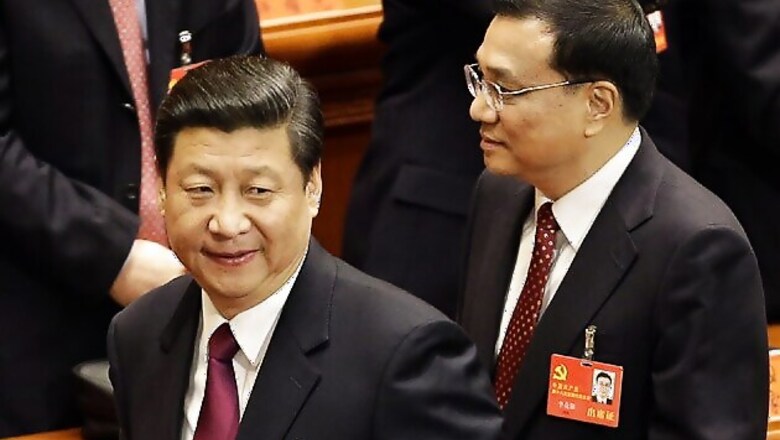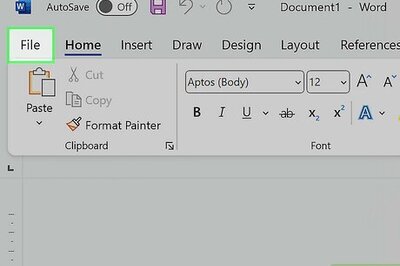
views
Beijing: China's Communist Party re-elected the nation's future leaders Xi Jinping and Li Keqiang onto its Central Committee on Wednesday, as it moved to conclude a pivotal transfer of power in the world's second-largest economy and rising superpower. Xi, now vice president, is expected to be named the party leader on Thursday, replacing President Hu Jintao in what would be only the second orderly transfer of power in 63 years of communist rule. Xi would take over from Hu as head of state next spring.
Li is to succeed Premier Wen Jiabao as China's top official for managing the economy. Both men were tapped for the positions at the last congress five years ago, but it's still not clear who will be appointed to other top positions. The new leaders will face slowing growth, rising unrest among increasing assertive citizens and delicate relations with neighboring countries.
The party's 2,200-plus delegates gathered at Beijing's Great Hall of the People also rubber-stamped the report Hu delivered to the gathering last week committing the party to continuing a pro-economic growth agenda while retaining firm political control. Hu urged stronger measures to rein in corruption and make the government more responsive to public demands, but offered little in the way of specifics. A report of the party's disciplinary body also was approved.
The next lineup in China's apex of power, the Politburo Standing Committee, will be announced on Thursday. Though congress and Central Committee delegates have some influence over leadership decisions, most of the lineup is decided among a core group of the most powerful party members and elders. Wang Qishan, a frontrunner along with Xi and Li for the Standing Committee, was named to the party's disciplinary body in a sign he would likely be named to the party's top body.
The congress votes are "fully democratic" but "there is a degree of inevitability," actor and party delegate Song Guofeng of Liaoning province said as he entered the hall. "We need to have continuity in leadership to carry on. They are already in the leadership core. The stability of the party and of the county is important."
China's leadership transitions are always occasions for fractious backroom bargaining, but this one has been further complicated by scandals that have fed public cynicism that their leaders are more concerned with power and wealth than government.
In recent months, Bo Xilai, a senior politician seen as a rising star, was purged after his aide exposed that his wife murdered a British businessman. An ally of Hu's was sidelined after his son died in the crash of a Ferrari he shouldn't have been able to afford. And foreign media recently reported that relatives of Xi and outgoing Premier Wen Jiabao had amassed vast wealth. The scandals have weakened Hu, on whose watch they occurred. Hu will remain president until March.
It was unclear whether he would retain his position as chairman of the Central Military Commission - or when the makeup of the new panel would be announced. Many observers have maintained that Hu would seek an additional two years in that post, to maintain leverage over the next leadership as previous retiring leaders have done, including former President Jiang Zemin, who is still believed to wield enormous influence from behind the scenes.
"There's no reason to think that he wouldn't wish to stay on, at least for a while. He wishes to, but the question is whether or not he succeeded," said Zhang Jian, of Peking University's School of Government. However, other analysts have said in recent days they believe Hu has resolved to step down from all posts, in part to set a new precedent for retiring leaders.
Jiang hoped Hu would follow his example, so that he would look less power-hungry in the history books, said Warren Sun, a Chinese leadership expert at Australia's Monash University. However, Hu never accepted Jiang's decision to hold on to the office, and doesn't want to endorse it now, Sun said. "It could be a gesture of slapping Jiang's face," Sun said.
The congress is a largely ceremonial gathering of representatives - mostly carefully selected from the national and provincial political and military elite. The real deal-making for the top positions on the Standing Committee is done behind the scenes by the true power-holders.
Aside from appointing Central Committee members, delegates assembled inside the Great Hall of the People were tasked with selecting the membership of the party's internal corruption watchdog, the Central Discipline Inspection Committee, and with voting on amendments to the party's charter.
After the congress ends, the Central Committee meets Thursday to select the next Politburo and from that, the Politburo Standing Committee, largely on the advice of influential leaders. The leaders also will select new members of the Central Military Commission, which oversees the 2.3 million-member People's Liberation Army, though it was not clear when that lineup would be announced.
The next cohort of leaders face daunting challenges, including efforts to pull the country's economy into a recovery from a sharp downturn, tense territorial disputes with Japan and other neighbors and the demands of a new middle class and millions of rural migrants for a better life.














Comments
0 comment